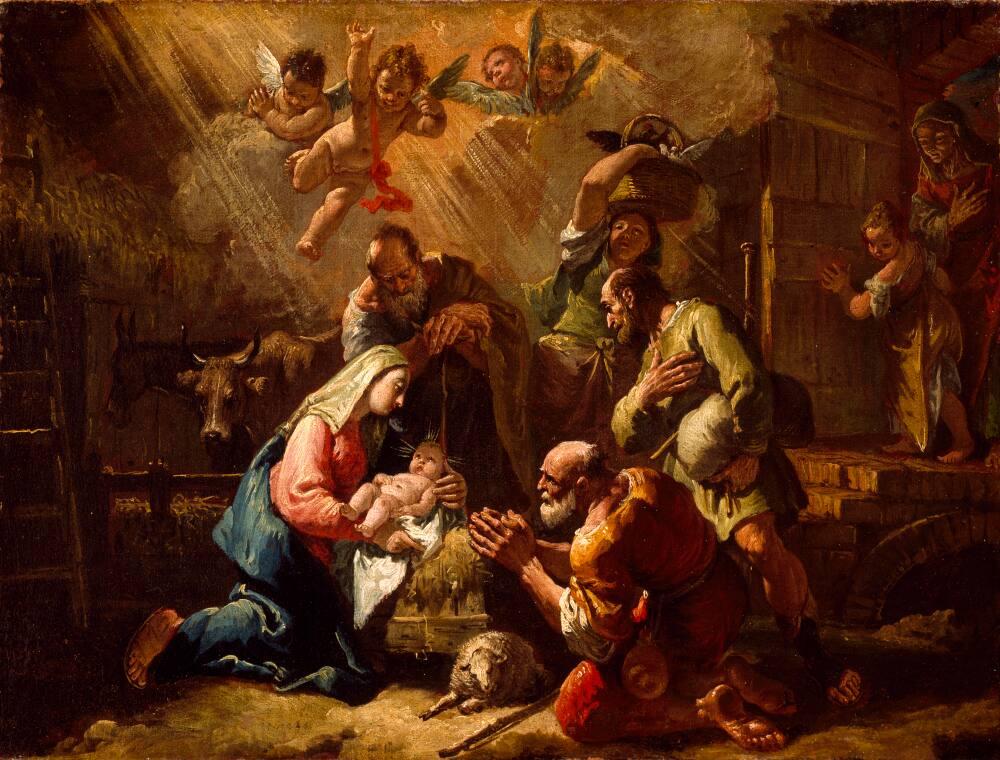The Advent Project: Week 4ಮಾದರಿ

Dec. 24: The Shepherds Find Christ in a Stable

The Adoration of the Shepherds, Francesco Fontebasso, Mid-eighteenth century. Oil on canvas, 44.9 × 58.9 cm. Museum of Fine Arts Houston, Houston, Texas. Public domain.
“Let the Stable Still Astonish!” Performed by: The Beckenhorst Singers. Lyrics: Leslie Leyland Fields; Music: Dan Forrest.
Poetry:
“The Shepherds”
by Mario Luzi, trans. by Luigi Bonaffini
And where would
those dazzled sheep graze now?
Where were the rams pushing them?
There was
no grass at that height.
There was some
Much further down
But they didn’t want it, that grass
was crushed
and bitter,
now
they craved something else.
And they were all made prophets and angels
of what?—they did not know—
imminent?
already happened?
The prophetized
and feared nativity
they saw and adored
blazing
well inside the human plasma
had made them so,
lost
in the beaming darkness.
THE SHEPHERDS FIND CHRIST IN A STABLE
As we have been tracing the love song of Song of Solomon throughout this Advent season, you may notice a contrast between the lush, kingly garden that is the scene of the lovers’ meeting, and the lowly stable that Jesus was born in––the young, royal bride, and the shepherds working through the night in a field. The God of the universe chose a place and means that were mundane, perhaps even profane, to make his grand entrance into the world. What does this teach us about Jesus? What does it teach us about ourselves, as his beloved?
Mario Luzi’s poem “The Shepherds” describes the sheep and shepherds alike as “dazzled” after the angels’ visit. Their normalcy was forever shattered. They were now made into “prophets and angels” of some blazing, glorious reality. The shepherds were humble, lowly workers, but they were transformed by Jesus being announced and given to them. These men were chosen by God: his beloved ones, made by God’s glorious arrival into that beautiful spouse.
Leslie Leyland Fields’ poem “Let the Stable Still Astonish,” set to music by Dan Forrest, draws out another interpretation of the lowly manger’s significance. God could have chosen Jesus to be born anywhere, into any family or place, but it was this astonishingly simple, undignified stable or cave that he chose. Fields describes the stable as it might have been––dusty, painful, and inappropriate for the birth of a child, let alone for the incarnation of the Lord God Almighty —and then presents it as an allegory for our lives. As God chose such a lowly place for the birth of his Son, so also does Christ choose to enter, be born into, “the darker, fouler rooms / Of our hearts.”
What does it mean when Love enters our dirtiest, darkest, most seemingly unworthy parts? What does it mean for Love to choose those who are lowly and humble, those who are overlooked by the world, to be his messengers and witnesses of his glory? What type of Bridegroom makes his birthplace a stable? What does it mean to face the terrific glory of God, and be told, “Do not be afraid”?
I encourage you to meditate on this reality: what it would mean to you to be met in the places of your heart that feel most unsuitable to the presence of a lover or a king. Meditate and consider until you find yourself dazzled, the former realities you subsisted on crushed and bitter, your life radiant and transformed. The Bridegroom Jesus will come again like the lover in Song of Solomon, in power and kingly glory, seeking a beautiful bride. But because he came first for the lowly; because he took on the humility of human flesh—not tidied up, but born helpless among animals and nomads and pain and dust—we do not have to fix ourselves to be loved by him. He himself will clothe, redeem, and transform us. Because he came to us, not despite our lowliness, but in the midst of it, we do not have to be afraid. The coming of his glory is news of great joy. A Savior, a lover, born to us! May you enter into Christmas with that joy!
Prayer:
My soul magnifies You, Lord, and my spirit rejoices in God my Savior, because You have looked with favor on the humble condition of Your servant…You have done a mighty deed with Your arm; You have scattered the proud because of the thoughts of their hearts; You have toppled the mighty from their thrones and exalted the lowly. You have satisfied the hungry with good things and sent the rich away empty.
Thank you for Your mercy, O God, great Lover of our souls.
Amen.
Adapted from Luke 1:46-55
Grace Ducker
Alumna, Biola University & Torrey Honors College
Administrative Coordinator
Office of the President
Biola University
For more information about the artwork, music, and poetry selected for this day, please visit our website via the link in our bio.
Scripture
About this Plan

Biola University's Center for Christianity, Culture & the Arts is pleased to share the 2024 Advent Project, a daily devotional series celebrating the beauty and meaning of the Advent season through art, music, poetry, prayer, Scripture, and written devotions. The project starts on the first day of Advent and continues through Epiphany. Our goal is to help individuals quiet their hearts and enter into a daily routine of worship and reflection during this meaningful but often hectic season. Our prayer is that the project will help ground you in the unsurpassable beauty, mystery and miracle of the Word made flesh.
More
ವೈಶಿಷ್ಟ್ಯದ ಯೋಜನೆಗಳು

Command Me

You're Not Too Late

The Gospels - Matthew

Is Divorce the Answer? A 3-Day Marriage Plan

Consciousness of the Presence of God

Affirming Children's Worth: A 3-Day Parenting Plan

Things We Sometimes Forget

The Reasons for Anxiety

The Joy of Laughter: A 3-Day Marriage Plan
